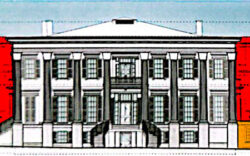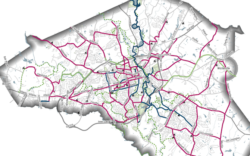Editor’s note: Eubanks sent this email to the Mayor and Commission last week. See City Dope for more information about the proposed Mitchell Street development, which will be up for a vote Sept. 5.
I’m writing in regards to what was listed as Item 15 at last week’s agenda-setting session, the Mitchell Street rezone.
To begin with, why are we even considering rezoning a property into a zoning classification currently under a moratorium when that property will not be subject to any changes made to that classification during the moratorium? Planning Commissioner Maxine Easom’s remarks are on point: Is that fair to current owners of property zoned CD? (Read a recap of the planning commission’s 6-1 vote to deny here.)
After the years and energy spent wrangling over what became The Mark, if the scope of study during the moratorium does not include zoning and design guidelines, this will be our greatest of many missed opportunities in developing a downtown that serves all Athenians. I can’t think of anyone who would say that developments such as The Mark are what our community is, or should be, aspiring to achieve. And yet it was allowed under current guidelines. Of particular concern is the inward focus of the development, the fortress frontage on Wilkerson, excessive parking for downtown living, a narrow 5-foot sidewalk unbuffered from a heavily traveled road. I could go on, but you get the point—our existing guidelines are less than perfect.
Now, again, we seem incapable of incorporating basic urban design lessons of appropriate scale and proportional right-of-way design for such a proposed tower. For the developer and buyers of the townhomes opposite this proposal, a rezone approval here signals that their good-faith investment in property per the county’s designated zoning and at a scale appropriate to the narrow street was misguided at best.
I think we all need to be honest with ourselves and recognize that the proposed Mitchell Street development would be vacation condos for well-heeled UGA fans that will be short-term rentals for the majority of the year. The excessive parking and the “motor court” driveway, the price tag and, of course, the developer’s own words indicate as much.
Would any retirees or young professionals choose to relocate to an expensive condo where few, if any, everyday needs are within walking distance? The only things within walking distance are Sanford Stadium and downtown bars and restaurants. These vacation homes would actually limit our ability to address workforce housing shortages by driving prices higher and taking from a limited supply of available land.
After watching the tape of this discussion at Tuesday’s agenda-setting session, I decided to go back and watch the full meeting, and was struck by how the arguments being made against item 14, the rezone request for Epps Bridge and Timothy roads, applied as well to item 15, but were not mentioned. What a difference 30 minutes made! I was particularly taken by how Planning Commissioner Alice Kinman’s comments were stressed in arguing against No. 14 (lack of a cohesive plan, spot zoning), but ignored in arguing for No. 15. And I agree with Commissioner Melissa Link’s take and appreciate her reference to numerous studies your discussion failed to take into account.
The most important point to be made is to ask what are we, as a community, getting in exchange for giving millions of dollars in benefits to the developers? Does this development move us closer to sustainability? Does it move us closer to having a greater inventory of workforce housing? Again, the excessive parking spaces and the price tag of the units preclude this from being an antidote to urban sprawl.
This property has been vacant for years because of the owners’ unrealistic expectations that do not match zoning, and at least previously didn’t meet community expectation either (see the earlier, very similar rezoning attempt). Why the sudden the rush to rezone?
We always hear that we’re not business friendly. At least a part of the anti-business argument stems from the fact that we don’t have a clear vision of what we want (insert any area in town here) to look like in the next 10 years. So when a developer presents a project that fits within code, if not zoning, we say, “Well, that’s not it,” and ask them to start over. Do-overs are costly for everybody.
We should not make a hasty decision on this rezone until after we have a clear idea of what we want downtown to look like and modify downtown design guidelines to get us there, so that developers can design accordingly from the start.
Online comments about this development can be made here.
Like what you just read? Support Flagpole by making a donation today. Every dollar you give helps fund our ongoing mission to provide Athens with quality, independent journalism.







Why Is the Commission Poised to Rezone Land for Another High-Rise?
Editor’s note: Eubanks sent this email to the Mayor and Commission last week. See City Dope for more information about the proposed Mitchell Street development, which will be up for a vote Sept. 5.
I’m writing in regards to what was listed as Item 15 at last week’s agenda-setting session, the Mitchell Street rezone.
To begin with, why are we even considering rezoning a property into a zoning classification currently under a moratorium when that property will not be subject to any changes made to that classification during the moratorium? Planning Commissioner Maxine Easom’s remarks are on point: Is that fair to current owners of property zoned CD? (Read a recap of the planning commission’s 6-1 vote to deny here.)
After the years and energy spent wrangling over what became The Mark, if the scope of study during the moratorium does not include zoning and design guidelines, this will be our greatest of many missed opportunities in developing a downtown that serves all Athenians. I can’t think of anyone who would say that developments such as The Mark are what our community is, or should be, aspiring to achieve. And yet it was allowed under current guidelines. Of particular concern is the inward focus of the development, the fortress frontage on Wilkerson, excessive parking for downtown living, a narrow 5-foot sidewalk unbuffered from a heavily traveled road. I could go on, but you get the point—our existing guidelines are less than perfect.
Now, again, we seem incapable of incorporating basic urban design lessons of appropriate scale and proportional right-of-way design for such a proposed tower. For the developer and buyers of the townhomes opposite this proposal, a rezone approval here signals that their good-faith investment in property per the county’s designated zoning and at a scale appropriate to the narrow street was misguided at best.
I think we all need to be honest with ourselves and recognize that the proposed Mitchell Street development would be vacation condos for well-heeled UGA fans that will be short-term rentals for the majority of the year. The excessive parking and the “motor court” driveway, the price tag and, of course, the developer’s own words indicate as much.
Would any retirees or young professionals choose to relocate to an expensive condo where few, if any, everyday needs are within walking distance? The only things within walking distance are Sanford Stadium and downtown bars and restaurants. These vacation homes would actually limit our ability to address workforce housing shortages by driving prices higher and taking from a limited supply of available land.
After watching the tape of this discussion at Tuesday’s agenda-setting session, I decided to go back and watch the full meeting, and was struck by how the arguments being made against item 14, the rezone request for Epps Bridge and Timothy roads, applied as well to item 15, but were not mentioned. What a difference 30 minutes made! I was particularly taken by how Planning Commissioner Alice Kinman’s comments were stressed in arguing against No. 14 (lack of a cohesive plan, spot zoning), but ignored in arguing for No. 15. And I agree with Commissioner Melissa Link’s take and appreciate her reference to numerous studies your discussion failed to take into account.
The most important point to be made is to ask what are we, as a community, getting in exchange for giving millions of dollars in benefits to the developers? Does this development move us closer to sustainability? Does it move us closer to having a greater inventory of workforce housing? Again, the excessive parking spaces and the price tag of the units preclude this from being an antidote to urban sprawl.
This property has been vacant for years because of the owners’ unrealistic expectations that do not match zoning, and at least previously didn’t meet community expectation either (see the earlier, very similar rezoning attempt). Why the sudden the rush to rezone?
We always hear that we’re not business friendly. At least a part of the anti-business argument stems from the fact that we don’t have a clear vision of what we want (insert any area in town here) to look like in the next 10 years. So when a developer presents a project that fits within code, if not zoning, we say, “Well, that’s not it,” and ask them to start over. Do-overs are costly for everybody.
We should not make a hasty decision on this rezone until after we have a clear idea of what we want downtown to look like and modify downtown design guidelines to get us there, so that developers can design accordingly from the start.
Online comments about this development can be made here.
Like what you just read? Support Flagpole by making a donation today. Every dollar you give helps fund our ongoing mission to provide Athens with quality, independent journalism.
Potential Costco in Oconee County Put on Hold
Podcast: The House Where Trump Was Conceived